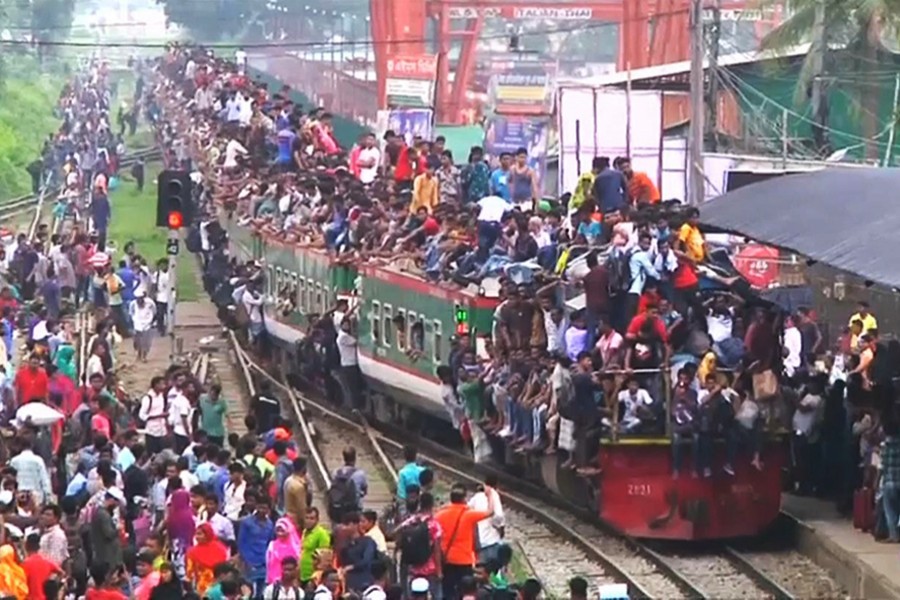The Passenger Welfare Association of Bangladesh (PWAB) has called for measures to protect the millions of homebound travellers ahead of Eid-ul-Fitr from harassment and to stop transport operators from charging extortionate fares.
The organisation also stressed the need to combat the horrific congestion on the highways and to prevent accidents during the busy holiday period, reports bdnews24.com.
Around three million people are expected to leave the capital each day for the Eid holidays. But a recent study by the Bangladesh University of Engineering and Technology (BUET) found that, of these 3.0 million travellers, only about 1.6 million have secured transport for the trip.
Each day, about 800,000 people will leave Dhaka on their Eid journeys by bus, 100,000 by train, 125,000 by launch, 300,000 by motorcycle and another 300,000 on private vehicles, said Dr Md Hadiuzzaman, director of the BUET Accident Research Institute.
But another 1.4 million will not be able to get tickets and use alternate means such as travelling on the roofs of trains, buses and launches.
The information was presented to the media at a PWAB event at the Dhaka Reporters Unity on Sunday.
Nearly twice the usual number of people will be returning home for Eid as the coronavirus pandemic has died down, said PWAB Secretary General Md Mozammel Hoque Chowdhury.
About 10 million people will be travelling from Dhaka to their ancestral homes for the Eid holidays.
Nearly 50 million more are expected to make inter-district journeys at this time.
Additional security, the utmost care, and the proper use of all available transport must be ensured for Eid trips, he said. Otherwise, congestion and other issues may cause difficulties for mass transport and lead to a hellish situation for travellers.
Dhaka residents are more likely to face travel difficulties and so footpaths must be cleared of encroachment by removing hawkers and vehicles parked illegally, Mozammel said.
The BRTA's construction work from Uttara to Gazipur is also expected to add to the heavy traffic on the roads from Dhaka to other districts, according to him.
To alleviate these issues, road intersections must be kept clean and small transport – such as rickshaws and easy bikes – cannot be allowed to run on main roads, he said.
“Dishonest law enforcers, extortion by transport owners, and the various toll points create congestion on many of the country’s highways.”
He claimed that transport owners and drivers had become "desperate" to get extortionate fares due to the rush of passengers, transport issues and an attempt to recoup losses due to the Covid pandemic.
Mozammel says the government’s ‘paper tiger stance’ – where it gave loud warnings about punishing those who ask for extortionate fares while taking no action to curb the practice – allowed the transport sector to charge double or even triple the regular fare.
Every year, several hundred lives are lost to road and river accidents during Eid as vehicles take on excess passengers and hike fares out of greed. He also blamed the use of unfit vehicles and vessels – including freight transport – to carry passengers along with the lack of safety and emergency materials and fatigued drivers and transport workers for the disasters.
According to PWAB data, 323 died and 622 were injured in 318 road accidents during Eid-ul-Fitr in 2021.
This year’s toll could be even higher as the number of passengers doubles, the researchers warned.
The recent rail strike has thrown off train schedules, while the online sale of tickets without proper oversight and publicity has allowed scalpers to step in, the organisation said.
Fares on river routes across the country are "extortionate" and excess tolls will be collected during Eid trips, it added.
Though the load of vehicles at various ferry ports, such as on the Shimulia-Banglabazar and Paturia-Daulatdia routes, has increased by nearly 50 per cent, the number of ferries operating on them has decreased, PWAB said.
Due to this, hundreds of vehicles will be stuck on either side of the river during Eid, said Mozammel, demanding that the number of ferries be increased while ensuring the proper use of available vessels.
Nor’westers, common around the start of spring, also pose additional risks to river crossings, he said.
To protect lives, unfit vessels must be taken out of commission and fit vehicles must be barred from taking on excess passengers.
Plainclothes law enforcers should be deployed at all bus, launch and rail stations to ensure security and prevent corruption, the PWAB general secretary demanded.


